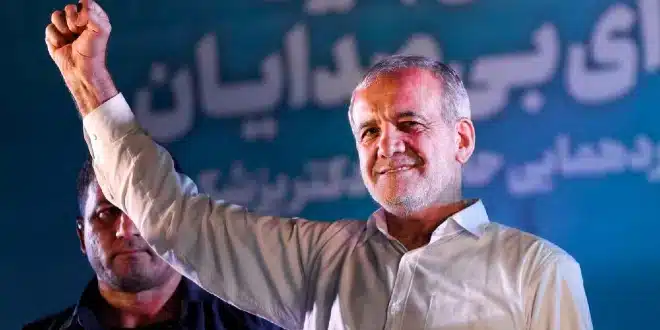Iran’s reformist candidate Masoud Pezeshkian emerged victorious in the runoff presidential election against the ultraconservative Saeed Jalili, according to the interior ministry’s announcement on Saturday.
Pezeshkian garnered over 16 million votes, while Jalili secured more than 13 million from the approximately 30 million votes cast. The electoral authority spokesman, Mohsen Eslami, reported that voter turnout was 49.8 percent, with more than 600,000 ballots being spoiled.
Expressing gratitude to his supporters, Pezeshkian said, “We extend the hand of friendship to everyone; we are all part of this country and should utilize everyone’s talents for the nation’s progress,” during a state television broadcast.
This election was called early following the death of the ultraconservative president Ebrahim Raisi in a helicopter crash. The first round of voting, marked by historically low turnout, necessitated this runoff. Supreme leader Ayatollah Ali Khamenei, who holds ultimate authority in Iran, had urged for higher turnout in the runoff, underscoring the election’s significance.
Amid heightened regional tensions over the Gaza conflict, disputes with the West concerning Iran’s nuclear program, and internal dissatisfaction due to the sanctions-impacted economy, this election took place under a challenging backdrop.
In the first round, Pezeshkian, the sole reformist candidate, led with about 42 percent of the votes, followed by Jalili with around 39 percent. This round saw only 40 percent participation from the 61 million eligible voters, the lowest since the 1979 Islamic Revolution.
Pezeshkian’s candidacy revived the hopes of Iran’s reformists after years of conservative and ultraconservative dominance. Supported by Iran’s main reformist coalition and endorsed by former presidents Mohammad Khatami and Hassan Rouhani, Pezeshkian, a 69-year-old heart surgeon, advocated for “constructive relations” with Western nations to revive the nuclear deal and end Iran’s isolation.
In contrast, Jalili, 58, known for his hardline anti-West stance and role as Iran’s former nuclear negotiator, garnered significant support from conservative factions.
In the lead-up to the runoff, both candidates participated in televised debates addressing issues such as low voter turnout, economic challenges, international relations, and internet restrictions. Pezeshkian pledged to ease internet restrictions and opposed police patrols enforcing the mandatory headscarf for women, a contentious issue since the 2022 death of Mahsa Amini in police custody, which had ignited widespread unrest.
This victory marks a significant shift, offering hope for a change in Iran’s domestic and international policies.


